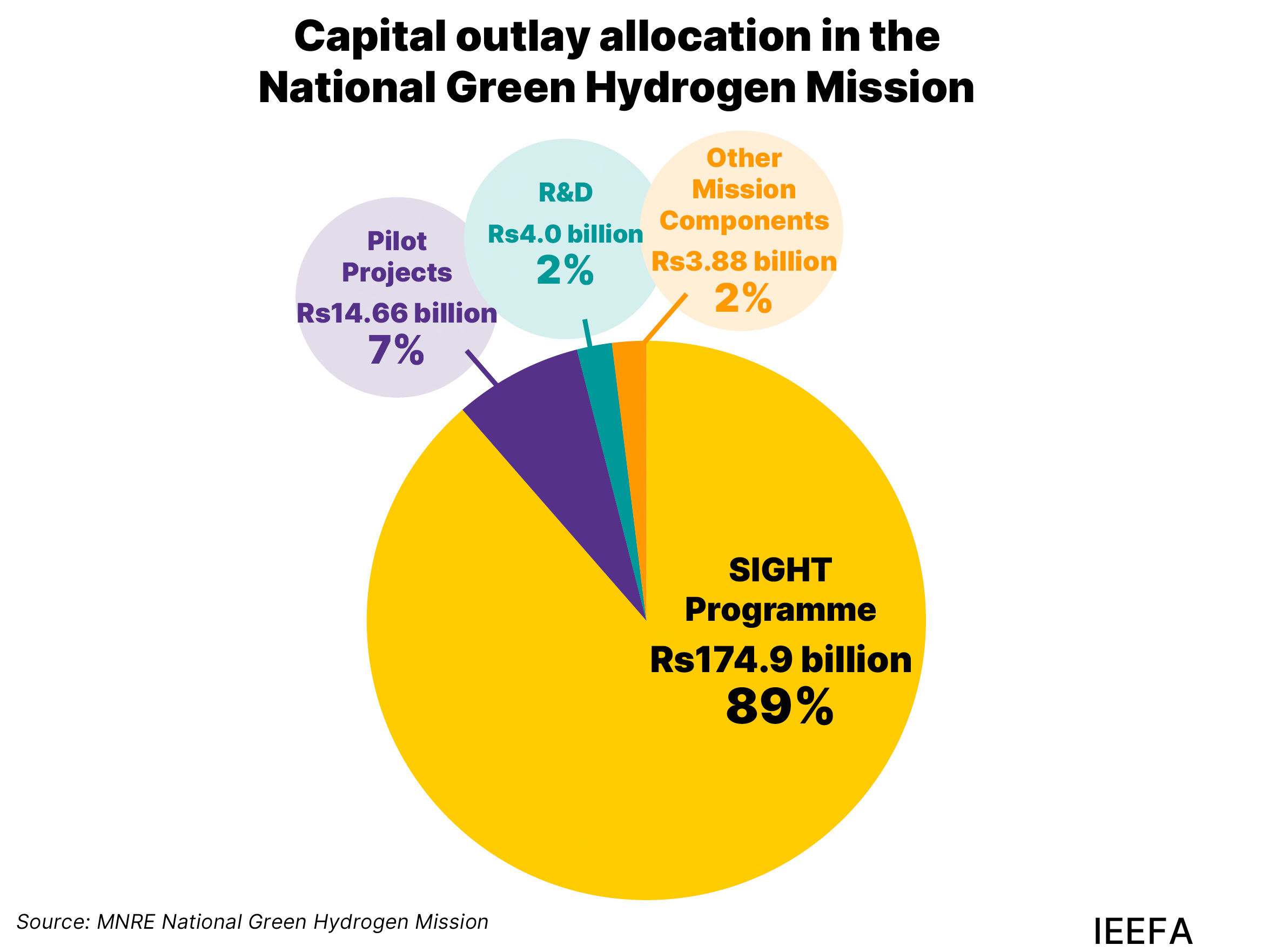India’s $2.1bn push for local electrolyser manufacturing and green hydrogen production sees strong interest from large companies

While the Strategic Interventions for Green Hydrogen Transition (SIGHT) programme is a vital first step, it can be finetuned to generate interest among start-ups and global players.
Key Takeaways:
The levellised cost of green hydrogen (LCOH) in India will likely fall by up to 40% to Rs260-310/kg (US$3-3.75/kg) with the help of various government incentives and policy support.
Electrolyser manufacturers will likely achieve a 7-10% reduction in total system costs for the first five years, with Rs2,960/kilowatt (kW) (US$36/kW) being the average annual realisable base incentive.
While the green hydrogen scheme is an important step for India, refinements are needed to promote long-term investment and project viability.
The green hydrogen definition framework needs enhancement with globally accepted definitions for critical aspects such as how green hydrogen is produced (additionality), its origin (deliverability) and timing (temporal matching) to make a global impact.
India’s US$2.1 billion push to transform it into a global green hydrogen powerhouse has received a strong response from large strategic investors in the country’s private sector, but the scheme can be further improved to attract start-ups and global players, according to a new joint report released by the Institute for Energy Economics and Financial Analysis (IEEFA) and JMK Research & Analytics.
The report finds that large Indian corporations have evinced strong interest in the tenders issued for both electrolyser manufacturing and green hydrogen production under the National Green Hydrogen Mission’s Strategic Interventions for Green Hydrogen Transition (SIGHT) programme. For both tenders, the bids received by the Solar Energy Corporation of India (SECI), overseeing the SIGHT programme, exceeded the capacity offered under the SIGHT programme’s incentives.
“By leveraging India’s advantage in low-cost renewable electricity, the SIGHT program aims to achieve competitive domestic electrolyser manufacturing and reduce the costs of green hydrogen production. The programme has received an enthusiastic response from the industry,” says the report’s contributing author Vibhuti Garg, Director – South Asia, IEEFA.
“The programme can be improved further to attract start-ups, be competitive for global players and create a supply chain and secure demand to ensure the industry’s long-term viability. If successful, it could help build India’s green hydrogen industry with benefits for a range of sectors, including agriculture, transport and manufacturing,” she added.
The SIGHT programme offers Rs4.44 billion (US$541 million) of incentives for companies to set up 1,500 megawatts (MW) of electrolyser manufacturing capacity. SECI received bids for more than double the capacity target at 3,328.5MW from 21 bidders. Eight companies were successful, including Reliance Electrolyser Manufacturing, John Cockerill Green Hydrogen Solutions and Jindal India, each securing 300MW. The remaining capacity was divided between Ohmium Operations, Advait Infratech and Larsen & Toubro, HomiHydrogen and Adani New Industries.
“Most of the winning participants had prior tie-ups with electrolyser technology companies, some even securing technology licence agreements before bid submission, showcasing proactive strategies that contributed to their success,” says the report’s co-author Jyoti Gulia, Founder, JMK Research & Analytics.
Similarly, for green hydrogen production, SECI received bids that exceeded the offered capacity by more than 100,000 metric tonnes per annum (MTPA). The SIGHT programme is offering Rs130.5 billion (US$1.57 billion) as incentives for setting up 450,000MTPA. But, SECI received bids for 551,500MTPA from 13 bidders. Winners include Reliance, Greenko, ACME, HHP Two (Hygenco), Torrent Power, CESC Projects, Welspun, UPL, JSW Neo Energy and Bharat Petroleum. However, almost 38,000MTPA of biomass-based capacity remains unallocated.
“Despite this enthusiasm, using green hydrogen to decarbonise domestic end-use industries remains uncertain due to challenges such as infrastructure limitations, regulatory ambiguities and the absence of clear mandates for its use,” says the report’s co-author Kapil Gupta, Manager, JMK Research.
“The winners will likely focus on export markets due to challenges and price concerns in the domestic market. The sector grapples with stringent safety regulations, technology changes, project delays, policy uncertainties and a need for robust hydrogen supply chain infrastructure,” he added.
The report highlights that while the SIGHT programme is off to a good start with enthusiasm from the industry, its ambitious goals can be hurt by its short tenure (five years) and comparatively low subsidies.
“Government intervention in establishing standards, policies and regulations and streamlining offtake for demand creation is crucial for developing the domestic green hydrogen market. Without such measures, India will likely remain a marginal player in the global green hydrogen market,” says the report’s contributing author Charith Konda, Energy Specialist, IEEFA.
The report also calls for strengthening the regulatory framework by issuing a clear set of emission standards for the green hydrogen industry, greater funding support for research & development and the adoption of global standards for India’s hydrogen ecosystem.
Read the report: India’s $2.1bn Leap Towards its Green Hydrogen Vision
Media contact: Debabrata Das ([email protected]) +91 98336 21905; Prionka Jha ([email protected]) +91 9818884854
Author contacts: Jyoti Gulia ([email protected]); Kapil Gupta ([email protected]); Vibhuti Garg ([email protected]); Charith Konda ([email protected])
About IEEFA: The Institute for Energy Economics and Financial Analysis (IEEFA) examines issues related to energy markets, trends, and policies. The Institute’s mission is to accelerate the transition to a diverse, sustainable and profitable energy economy. (ieefa.org)
About JMK Research: JMK Research & Analytics provides research and advisory services to Indian and International clients across renewable energy, electric mobility and the battery storage market. (www.jmkresearch.com)
















